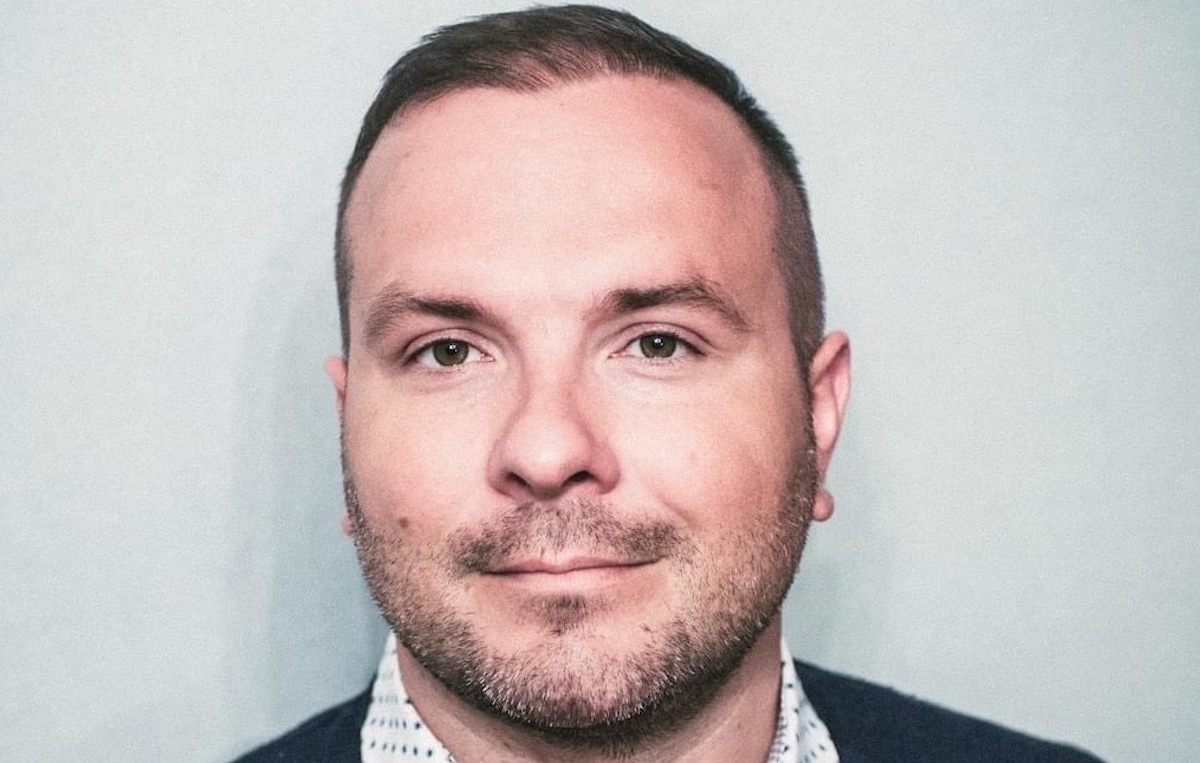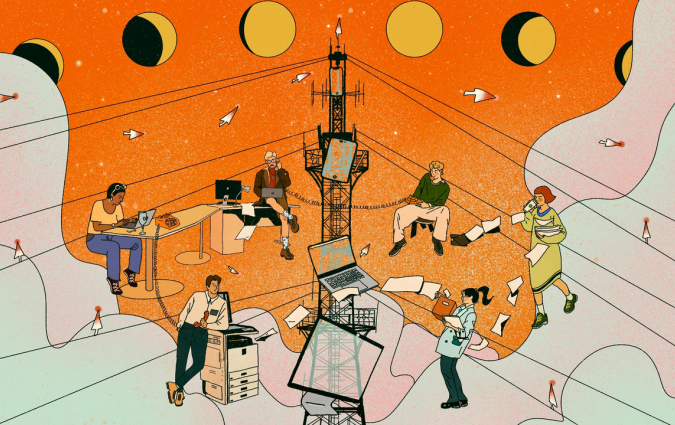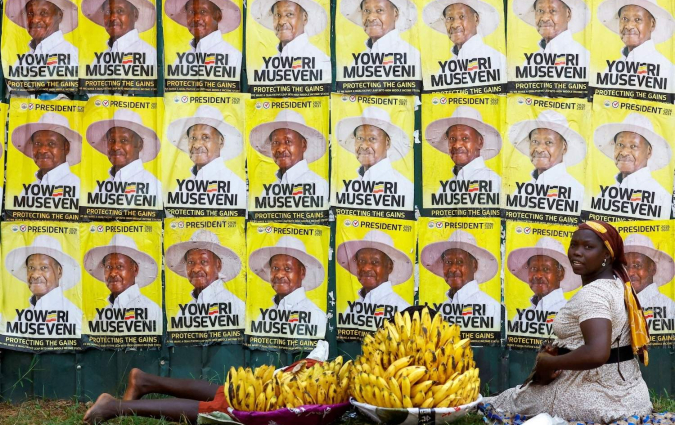As Putin cracks down on the free press, independent news site Meduza aims to be Russians’ “only window to the world”

Alexey Kovalev.
Alexey Kovalev is an award-winning Russian investigative reporter and the editor behind dozens of ground-breaking investigations at Meduza, a Russian independent news site. He’s written for the Moscow Times, the Guardian and the New York Times, and is the founder of a now-dormant investigative outlet called Noodle Remover. “In Russian ‘putting noodles in someone's ears’ means lying to them,” he says.
In 2019, Alexey joined independent news site Meduza as an investigative editor, and he’s been working there ever since. On 5 March, he left Russia on foot for Riga with his bags on his back and his dog. “I barely had enough time to call my parents,” he tweeted. “I felt a massive door slam shut behind my back.” On Wednesday morning, I spoke with Alexey. We discussed his work at Meduza, the impact of the new legislation on press freedom and the challenges of reporting on Russia from abroad. Our conversation has been lightly edited for brevity and clarity.
Q. Meduza was born out of censorship in 2014. Now the situation is even worse. How would you describe it?
A. Meduza was indeed born out of censorship in the first phase of this war Russia is still fighting eight years on. At that time the core team of Meduza worked for a website called lenta.ru. It was the most popular news website in Russia and it was independent. But of course, if you're physically in Russia, you're not really independent. You're still reliant on an infrastructure that somebody else owns and they are always in the Kremlin's pockets. So this is what happened in 2014: oligarch Alexander Mamut fired editor-in-chief Galina Timchenko, who is now our publisher, and the entire editorial team walked out in solidarity with her. The team created Meduza and moved to Riga, a Russian-speaking city which is near Moscow and culturally close. That was a very wise decision.
Q. And yet you were based in Moscow until a few days ago.
A. I was. And it's a really difficult transition for me now. Now I am something that I never intended to be: an exiled reporter. We still have sources. But our work is going to be a lot more difficult because people will be afraid to talk to us. They already are.
Q. How are you doing now?
A. I'm so lucky and privileged. I didn't have to wait for days on the Ukrainian border. I didn't have to wait on a train station in Berlin for some volunteer to pick me and my family. My friends picked us up on the other side of the border and took us to safety. But this is not really my decision. I had to start my life from scratch. I have a lot of friends helping me out, but it’s still a huge shock to my family.
Q. We’ve seen a gradual tightening of press freedom in Russia. How has your job changed in the last few years?
A. This process has been going on for years. We've been preparing for it and now it’s starting to pay off. We were blocked on Friday but we only lost part of our audience because we've been educating them about using VPNs and we've been transitioning to other platforms like Telegram and our own app.
Q. How are you managing to reach your audience in Russia now that your website is blocked?
A. I can't give you any specific plans in the works because it's a game of cat and mouse. But it's about diversifying. You shouldn’t put all the eggs in one basket. If we only relied on our website, we would be completely snuffed out by now. But we are branching out. On Telegram we went from half a million subscribers to a million just in the last few days. It's crazy. And we've been running 24/7 live coverage of the war every day, both on our website and on our telegram channel.
Q. Is your Telegram channel available in Russia?
A. It is. Telegram isn't blocked in Russia yet. All the state propaganda is also on Telegram now. So they rely on the same infrastructure. They can’t block Telegram unless they want to be left alone screaming into the void.
Q. How would you say Meduza’s audience has evolved in the last few years?
A. About 70% of our audience is inside Russia. We are a Russian media outlet. Our finances and servers are located outside the country for safety reasons. But we always considered ourselves a domestic outfit. And that's how our sources treat us. This is going to change now. But at least that’s how we thought of ourselves.
Q. What's your business model?
A. We’ve rebuilt our business model twice in two years. Before we were declared a foreign agent in April 2021, we were the only commercially viable, independent news media not reliant on oligarchs or state contracts. We carved out a business niche for ourselves in the advertising market. We were growing and planning to expand.
All this was wiped out when we were declared a foreign agent last year. No company wanted these huge legal disclaimers on top of their ads, so we've been relying on donations ever since. Our designation as a foreign agent was actually a blessing because we were the first and we managed to build a very successful donations campaign inside Russia. It's one thing when you're the first independent media to be declared as a foreign agent. It's different when there are many others.
However, now we’ve also lost this donation revenue. Our savings have been completely wiped out. The rouble is in freefall and you can’t transfer any money from Russia. So we’ve lost most of our donations and revenue streams from inside Russia and we are launching a crowdfunding campaign aimed at people abroad.
Q. What’s your pitch?
A. We are the only remaining voice both in Russia and broadcasting outside Russia in English. Most international news outlets have evacuated their staff from Moscow. It's never happened before. The New York Times, which has been reporting from Moscow throughout the entire 20th century, is pulling their people out because they can’t guarantee their safety anymore. So we are the only outlet that still gathers information on the ground and we broadcast both in Russian and English.
Q. Why would you say that Putin allowed some degree of press freedom until now?
A. Until two weeks ago, we had what smart people call a hybrid authoritarian regime. It was an authoritarian regime but with some vestiges of democratic process. It's all gone now.
This was based on the assumption that Putin was cynical and ruthless but still rational in his decisions. He knew that if Russia still wanted to be part of the world, it needed to maintain at least some semblance of democracy, which also included some free media. But when you're talking about free and independent media in Russia, you are talking about outlets that were on a very short leash.
The Echo of Moscow, for example, was reliant on its board of directors, which was appointed by Gazprom. It was also reliant on the financial and physical infrastructure provided to them by the largest oil and media company. Its editor-in-chief navigated this landscape for years, trying to be friends with everyone, but it didn't help him in the end. Now his radio station was stripped of its licence and Sputnik radio will be broadcasting on the same frequency from now on.
Q. Despite this oppressive climate, you were able to operate as a reporter inside Russia. How did you manage to do it?
A. We were energised by the importance of our mission. Meduza is very popular and that’s a huge responsibility because a lot of people rely on us for factual information that nobody else will have either the experience, the resources or the will to report. We are immensely proud of this. It's an incredibly physically and mentally taxing job. But it still energises me to know that for so many people now we are the only lifeline, the only window to the world.
Q. How did you manage to get people to talk to you?
A. The pressure on us has been building up for a while. We were called traitors and spies every day by the state propaganda. But we still had high-level sources in government because people knew that we were legitimate and very popular. No matter what you think of Meduza, it has millions of readers and it's the only way to reach out to them.
Q. Did that change after April 2021?
A. It did. Many people, especially those in a public position, are now afraid that their reputation will be tarnished if they talk to us. The goal was to scare people away from us, to cut us off from our sources. In some cases, unfortunately, it worked. The designation had a chilling effect, and these new laws and the fact that we are blocked will have an effect too. But we will have to find a way around it because there is no other way for us.
Q. You have reported extensively on the people around Putin. How would you say they see this invasion? Do you think they were surprised or horrified by it?
A. Our sources tell us that everyone was caught completely unaware. Putin likes to keep everyone on edge. He likes to ambush people with unexpected decisions. So everyone was shocked and now people are just demoralised and disoriented.
When he made the decision, Putin pulled his entire security council in front of the TV cameras and had them swear loyalty to him and his plan. Then he did the same with the Duma [the Russian Parliament] and with the top business people. So now they are kind of bound by a blood oath. However, there are already a few defectors and a few cracks in the system. I assume it's not as united as it appears to be. All these people are used to living the good life and spending their money in Paris, not Kazakhstan.
Q. We've never seen this degree of isolation and pressure on Putin and the people around him. Do you think it will have any effect?
A. It’s unprecedented. So I can't really say what happens next. People are saying that Russia is being rolled back to 1991 but that wouldn't be true. Back then our economy was in tatters and everyone was poor, but at least there was hope. From now on, things are going to be worse for the foreseeable future. I wanted to be there to cover this as a journalist. If I didn't have a family, I would probably have stayed.
Q. What will be the impact of this for younger Russians who grew up using Facebook and Twitter and now find themselves disconnected from the outside world?
A. It's very demoralising, especially for people in their 20s who've spent literally their entire lives under Putin. Even if they wanted to, they couldn't go anywhere. Whatever meagre savings they had in roubles is now all gone. If they emigrate, their credit cards won't work.
Russia is now a pariah nation. We are toxic assets that everybody wants to get rid of. So even if these people wanted to leave Russia, they would be stuck there for an indefinite amount of time with no hope, no prospects and no connection with the outside world.
It's gonna be pretty grim and it's pretty unfair to young Russians who would want to maintain some connection with this world that now rejects them. You can’t even use Netflix or Spotify right now. I know why this is happening. But it's still pretty unfair to people with no control over the situation. I hope the outside world finds a way to incorporate young Russians into the global community.
You can donate to Meduza's crowdfunding campaign in this link.
If you want to know more:
- Read this piece about independent journalism in Russia published by Nieman Reports in 2017
- Read this piece about Meduza published by the New York Times in 2021
- Read this recent essay Alexey wrote for the New York Times
In every email we send you'll find original reporting, evidence-based insights, online seminars and readings curated from 100s of sources - all in 5 minutes.
- Twice a week
- More than 20,000 people receive it
- Unsubscribe any time







